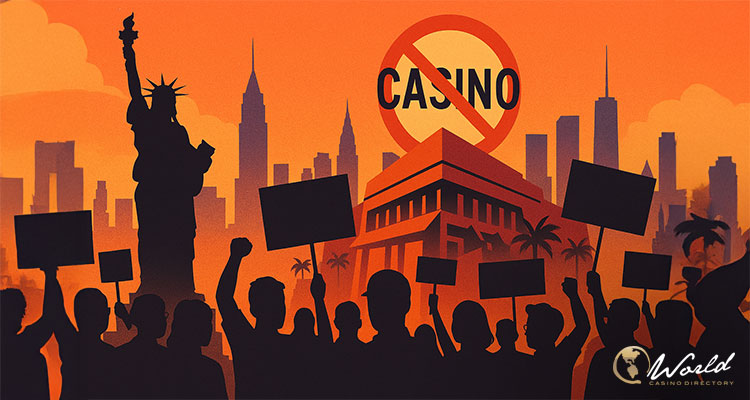Efforts to bring a casino to the heart of Manhattan officially ended this week after the final remaining proposal, the Freedom Plaza development on the East River, was voted down by a state-commissioned community advisory committee. The six-member panel rejected the bid 4-2, with representatives chosen by Governor Kathy Hochul and Mayor Eric Adams supporting the plan, but lawmakers’ appointees firmly opposed.
The $11 billion project, led by the Soloviev Group in partnership with Mohegan, envisioned a sprawling six-acre complex south of the United Nations headquarters. Plans included a 1,250-room hotel, 1,080 units of affordable housing, a terraced park, a daycare center, and a Museum of Democracy, alongside a large underground casino. Developers had hoped the extensive community amenities would help win approval.
“Freedom Plaza was a transformative project that promised benefits that our community deserved,” Soloviev Group CEO Michael Hershman said after the vote, according to Associated Press. Ray Pineault, CEO of Mohegan, argued the process “did not allow for a recognition of the impact we could have had on the broader community of New York and the many individuals who would have benefited from new jobs, housing, and community benefits.”
Local Leaders Cite Congestion and Safety
Despite developers’ promises, elected officials representing Manhattan’s East Side voiced sharp opposition. In a joint statement, Council Member Keith Powers, State Senator Kristen Gonzalez, Assembly Member Harvey Epstein, and Borough President Mark Levine explained: “Our neighbors on the East Side of Manhattan have communicated to us, and to the CAC, through hours of public hearings, significant concerns regarding increased congestion, public safety, and the quality-of-life concerns this project would introduce into our community.”
Nearby residents echoed those concerns. At a public hearing earlier this month, Tudor City residents Mark and Cynthia Harris criticized the bid. Cynthia stated that “nobody” she spoke with was “in favor of a casino being put right in front of our face!”
City officials were split on the outcome. Adams, who has expressed openness to casinos as potential job and tourism drivers, said ahead of the vote: “Casinos can bring jobs. It can bring stability, tourism. So, I was surprised at some of the negative votes.” His spokesperson, William Fowler, described the decision as an “unfortunate outcome” that eliminated opportunities for billions in new investment.
A String of Failed Manhattan Bids
Freedom Plaza was the last of several high-profile Manhattan casino proposals. Earlier this year, a Jay-Z-backed Caesars Palace bid in Times Square and Larry Silverstein’s Avenir project on the Far West Side were also rejected after resistance from community boards and business groups. The Broadway League, a powerful theater trade association, strongly opposed the Times Square casino, warning it would disrupt the area’s character and hurt local businesses.
The defeats mean Manhattan will be excluded from the state’s upcoming allocation of three downstate casino licenses, a process launched after voters approved a 2013 constitutional amendment expanding gambling opportunities.
Attention Shifts to Outer Boroughs
With Manhattan out of contention, attention turns to remaining bids elsewhere in New York City and nearby areas. Proposals still under consideration include a Bally’s casino on the Bronx’s Ferry Point Golf Course, a Hard Rock project led by Mets owner Steve Cohen next to Citi Field in Queens, a Resorts World expansion at Aqueduct Racetrack in Queens, and an MGM Empire City upgrade in Yonkers. A Coney Island plan is also on the table but faces its own growing opposition.
Brooklyn Council Member Justin Brannan, who chairs the Community Advisory Committee for Coney Island, has already pledged to vote against the project. In a Brooklyn Paper op-ed, he wrote: “There are things we need in Coney Island, but a casino isn’t one of them.” He argued that such a development would harm local businesses, worsen congestion, and fail to address residents’ long-standing needs, from flooding to affordable housing.
Brannan urged investment in alternatives, such as year-round attractions, small business protections, and better infrastructure. “Coney Island doesn’t want pity and we don’t need to be saved. We need respect and resources,” he said.
What Comes Next
The New York State Gaming Facility Location Board will recommend up to three projects to the Gaming Commission for final approval by December. While the industry has long coveted a Manhattan foothold, the borough’s dense population, traffic challenges, and strong neighborhood resistance have proven insurmountable obstacles.
As Manhattan Borough President Mark Levine summed it up: “The bar for approving a casino in Manhattan was always going to be extremely high. This is not to minimize all the employment and other economic benefits such proposals offer. However, in the end, opposition from residents and businesses in Manhattan proved too great.”
With the door closed on Manhattan, developers and state officials must now decide whether outer-borough projects can deliver the balance of community benefit and economic promise needed to secure approval.



